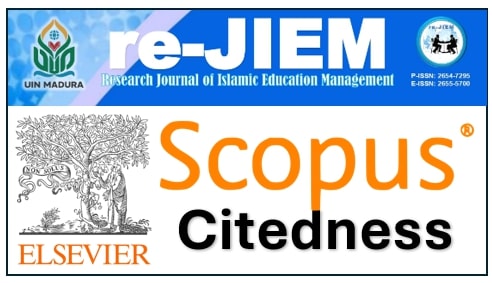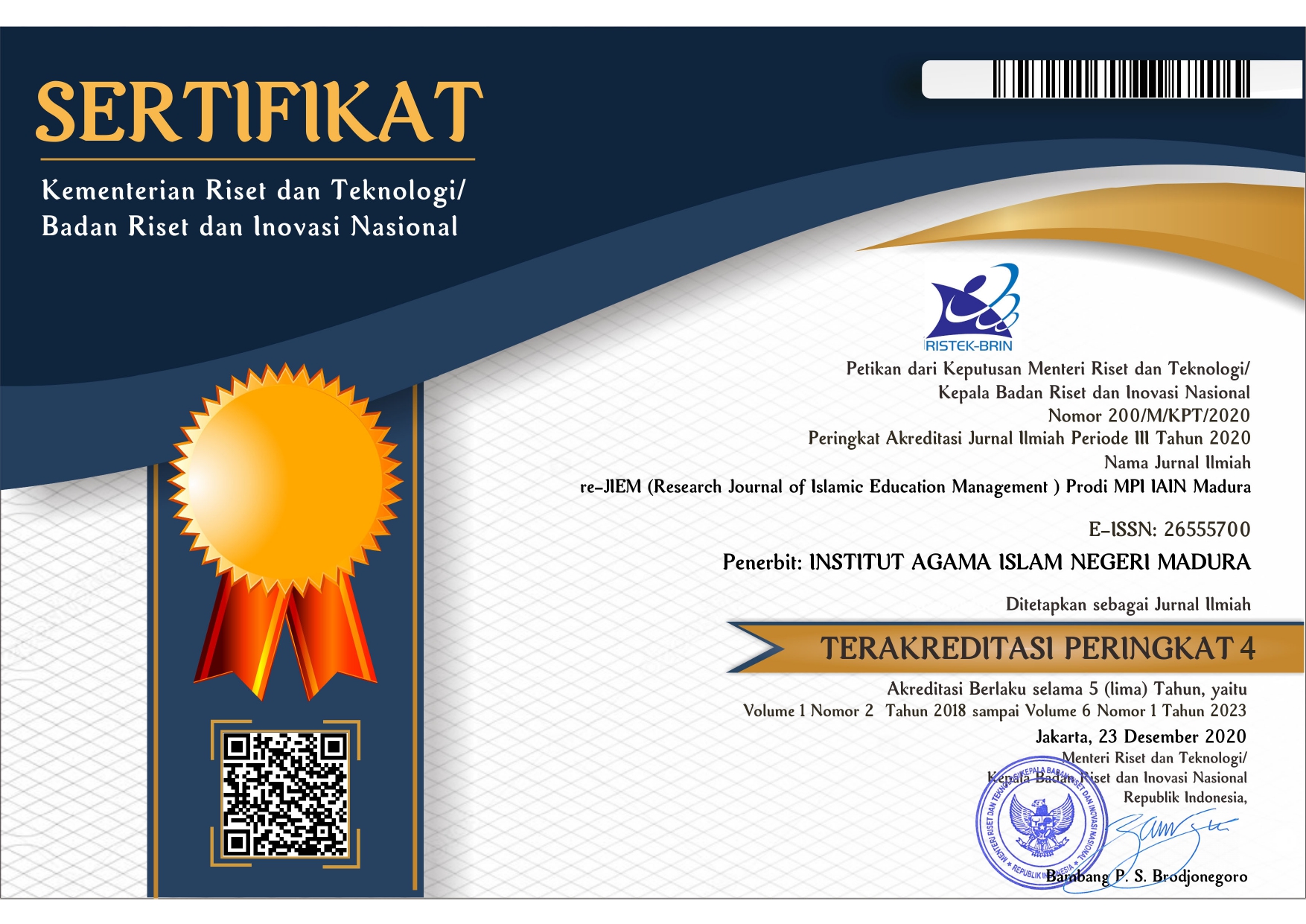IMPLEMENTASI MANAJEMEN MUTU TERPADU DI PONDOK PESANTREN AL-FALAH SUMENEP
 Abstract views: 425
,
Abstract views: 425
,
 PDF downloads: 508
PDF downloads: 508
Abstract
Islamic boarding schools are educational institutions that have been recognized through law No. 20 of 2003 and also have an obligation to contribute to achieving national education goals. This study aims to describe the implementation of integrated quality management in Al-Falah Islamic Boarding School Sumenep by using a qualitative approach as well as interviews, observations, and documentation as data collection techniques. The results showed that the main vision of the Al-Falah Sumenep Islamic Boarding School is to produce community leaders (mundirul-qoum) with five souls, namely the soul of sincerity, independence, simplicity, ukhuwah Islamiyah, and the spirit of freedom. All activities are designed for the benefit of students as the main input (raw input) in education. learning at the Al-Falah Islamic boarding school Sumenep is designed with a 24-hour learning model, while curricular learning is carried out classically. Teachers or teachers at the Al-Falah Sumenep Islamic Boarding School were recruited from Al-Falah Sumenep alumni themselves with several criteria, namely scientific competence, teaching competence, and personality. A thorough evaluation was carried out on Thursday and led directly by the leadership of the Al-Falah Sumenep Islamic boarding school followed by all teachers to ensure that the activities and activities of the pesantren went according to plan.
Downloads
References
Ali, Noor Azman, and Mohamed Zairi. Service Quality in Higher Education. University of Bradford, School of Management, 2005.
Azis, Abdul. “Kompetensi Guru Dalam Penggunaan Media Dengan Mutu Pendidikan.” Jurnal Pelopor Pendidikan 5, no. 1 (2014): 49–58.
Ismail, Feiby. “Implementasi Total Quality Management (TQM) Di Lembaga Pendidikan.” Jurnal Ilmiah Iqra’ 10, no. 2 (2018).
Juran, J M, and F M Gryna Jr. “Designing for Quality.” Quality planning and analysis. New York: McGraw-Hill (1980): 167–202.
Mubah, Hilmi Qosim. “Resistensi Pondok Pesantren Dalam Mengelola Santri Di Masa Pandemi Covid-19.” Jurnal Isema : Islamic Educational Management 6, no. 2 (2021): 119–130.
Nasution, Mulyadi Hermanto. “Manajemen Mutu Terpadu (MMT) Dalam Pendidikan Islam.” Al-Muaddib: Jurnal Ilmu-Ilmu Sosial Dan Keislaman 4, no. 2 (2019): 228–248.
Nihwan, Muhammad, and Paisun Paisun. “Tipologi Pesantren (Mengkaji Sistem Salaf Dan Modern).” Jurnal Pemikiran dan Ilmu Keislaman 2, no. 1 (2019): 59–81.
Rahmawati, Salma Nur Azizah, and Achmad Supriyanto. “Pentingnya Kepemimpinan Dan Kerjasama Tim Dalam Implemeentasi Manajemen Mutu Terpadu.” JDMP (Jurnal Dinamika Manajemen Pendidikan) 5, no. 1 (2020): 1–9.
Rofiatun, Rofiatun, and Mohammad Thoha. “Manajemen Pembinaan Kedisiplinan Santri Dalam Mengikuti Kegiatan Keagamaan Di Pondok Pesantren Nurus Shibyan Ambat Tlanakan Pamekasan.” re-JIEM (Research Journal of Islamic Education Management) 2, no. 2 (2019): 278.
Sallis, Edward. Total Quality Management in Education. Yogyakarta: IRCiSoD, 2006.
Shaifudin, Arif. “Manajemen Mutu Dari Industri Untuk Pendidikan.” El-Wasathiya: Jurnal Studi Agama 6, no. 2 (2018): 237–259.
Solichin, Muchlis, Moh. Hafidz, and Hilmi Qosim Mubah. “Kualitas Program Persiapan Guru Tugas Di Pondok Pesantren Mambaul Ulum Bata-Bata Panaan Palengaan Pamekasan.” re-JIEM (Research Journal of Islamic Education Management) 2, no. 2 (2019): 305. http://ejournal.stainpamekasan.ac.id/index.php/re-jiem/article/view/2870.
Sriwidadi, Teguh. “Manajemen Mutu Terpadu.” The Winners 2, no. 2 (2001): 107–115.
Supriyanto, Didik. “Madrasah Bermutu Berbasis Manajemen Mutu Terpadu (MMT).” MODELING: Jurnal Program Studi PGMI 2, no. 1 (2015): 70–84.
Tamlihah, Tamlihah, Abd. Mukhid, and Hilmi Qosim Mubah. “Implementasi Manajemen Kurikulum Pesantren Dalam Membentuk Karakter Mandiri Santri Di Pondok Pesantren Nurus Sibyan Ambat Tlanakan Pamekasan.” re-JIEM (Research Journal of Islamic Education Management) 3, no. 1 (2020): 96.
Thakkar, Jitesh, S G Deshmukh, and Anil Shastree. “Total Quality Management (TQM) in Self‐financed Technical Institutions: A Quality Function Deployment (QFD) and Force Field Analysis Approach.” Quality Assurance in Education (2006).
Yahya, Fata Asyrofi. “PROBLEM MANAJEMEN PESANTREN, SEKOLAH DAN MADRASAH: Problem Mutu Dan Kualitas Input-Proses-Output.” el-Tarbawi 8, no. 1 (2015): 93–109.
Yanti., Eti Rochaety. Pontjorini Rahayuningsing. Prima Gusti. Sistem Informasi Manajemen Pendidikan. Jakarta: PT. Bumi Aksara, 2010.
Copyright (c) 2022 Abdul Azis

This work is licensed under a Creative Commons Attribution-ShareAlike 4.0 International License.
Authors who publish with this journal agree to the following terms:
Authors retain copyright and grant the journal the right of first publication with the work simultaneously licensed under a Creative Commons Attribution-ShareAlike 4.0 International License that allows others to copy and redistribute the material in any medium or format with an acknowledgment of the work's authorship and initial publication in this journal and also allows them to remix, transform, and build upon the material for any purpose, even commercially, with contributions under the same license as the original.
Authors are able to enter into separate, additional contractual arrangements for the non-exclusive distribution of the journal's published version of the work (e.g., post it to an institutional repository or publish it in a book), with an acknowledgment of its initial publication in this journal.
Authors are permitted and encouraged to post their work online (e.g., in institutional repositories or on their website) prior to and during the submission process, as it can lead to productive exchanges, as well as earlier and greater citation of published work.


























